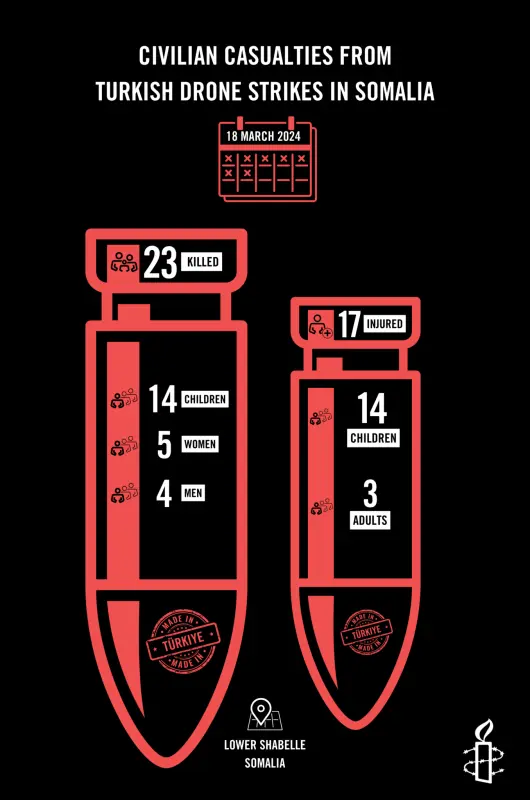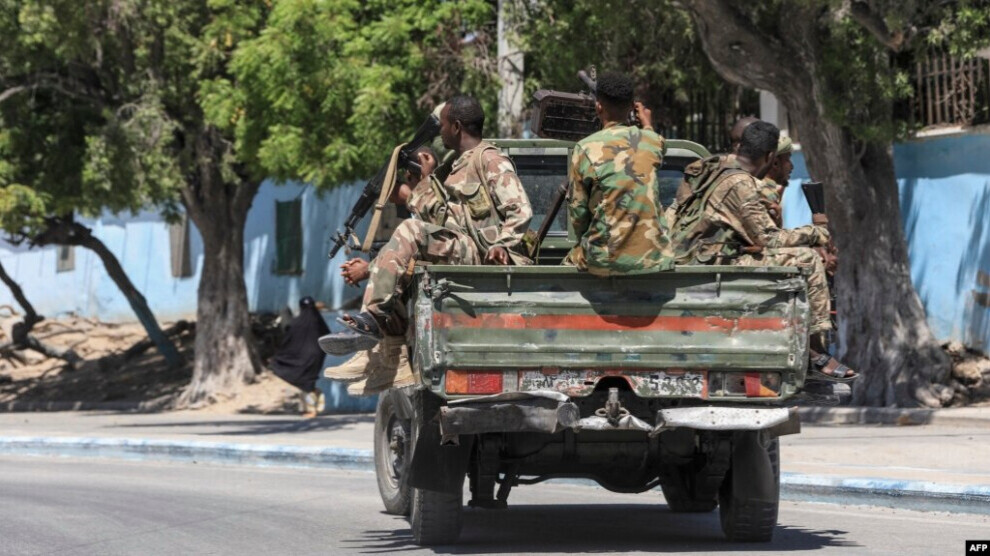Two strikes that killed 23 civilians during Somali military operations supported by Turkish drones must be investigated as war crimes, Amnesty International said today.
Civilians killed in the strikes on 18 March 2024 included 14 children, five women and four men. Another 17 civilians were injured in the strikes: 11 children, two women and four men. All are from the marginalized Gorgaarte clan.
The strikes hit the Jaffey farm, about three kilometres west of Bagdad village in the Lower Shabelle region, between 8pm and 8.30pm. Victims and other residents told Amnesty International that the drone strikes followed heavy ground fighting that started earlier that day between the armed group Al-Shabaab and Somali security forces close to the villages of Jambaluul and Bagdad.
“The Somali and Turkish governments must investigate these deadly strikes as a war crime, and put an end to reckless attacks on civilians,” said Tigere Chagutah, Amnesty International’s Regional Director for East and Southern Africa.
“In Somalia, civilians have borne the brunt of suffering in war far too often. These horrific deaths must not be overlooked. The devastated survivors and their families deserve truth, justice and reparations.”
Amnesty International remotely interviewed 12 people, including four victims and eyewitnesses, and four family members of victims. Researchers also reviewed satellite imagery and medical reports, analyzed photos of victims and weapons fragments, and geolocated videos from the scene of the attacks and of Turkish drone operations at Mogadishu International Airport.
Based on the photos of the munitions scrap metal, Amnesty International’s weapons investigator was able to confirm that the strike was conducted with MAM-L glide bombs, which are dropped from TB-2 drones. Both are manufactured by Turkey. Attacks that fail to differentiate between military objectives and civilian objects are indiscriminate and may amount to war crimes.
It is unclear whether Turkish or Somali forces were in control of the TB-2 drone at the time of the strikes on Jaffey farm. One source in the Somali government told Amnesty International that members of the National Intelligence and Security Agency fly the TB-2s during combat operations against Al-Shabaab. However, in 2022, the UN Panel of Experts for Somalia reported that, according to the Turkish government, Turkey did not transfer the drones to Somalia in violation of the UN arms embargo, but rather operates the drones themselves “in the fight against terrorism”. Also in 2022, Ahmed Malim Fiqi, Somalia’s then Interior Minister who is now Foreign Minister, was reported to have said that while Turkish forces operate the drones, Somali commanders provide the targets.
In recent years, Turkey has provided military equipment and support to Somalia. Satellite imagery and videos geolocated by Amnesty International’s Crisis Evidence Lab show Turkish TB-2 drones on the runway at Mogadishu International Airport as early as 12 September 2022. After years of training the “Gorgor” unit of the Somali armed forces at Turkey’s Camp Turksom in Mogadishu, the two countries signed a Defense and Economic Cooperation Framework Agreement in February 2024.
On 5 April, Amnesty International sent letters to the governments of Somalia and Turkey, asking for details on the 18 March operation, including which military’s forces were controlling the drone at the time of the strikes. At the time of publication, neither government had replied.

















